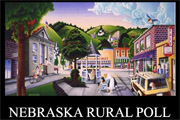Agricultural Economics, Department of

Nebraska Rural Poll
Date of this Version
8-2015
Document Type
Report
Citation
Nebraska Rural Poll, Research Report (August 2015) 15-2, 30 pages
Institute of Agriculture and Natural Resources, University of Nebraska-Lincoln
Also available at https://ruralpoll.unl.edu/pdf/15involvement.pdf
Abstract
Most rural Nebraskans have participated in community involvement activities but they have not been as involved in some political activities. However, most rural Nebraskans have spoken with their pocketbooks on political and social issues by either buying or boycotting products because of the social and political values of the company providing them. And, many rural Nebraskans have signed a written petition about a political or social issue and have contacted a local public official to express their opinion.
Certain groups are more likely than others to have participated in community and political involvement activities. While younger persons are more likely than older persons to have volunteered, older persons are more likely to have participated in various political activities. And, persons with higher household incomes and persons with higher education levels are more likely than persons with lower incomes and less education to have done most of the community and political involvement activities.
Most rural Nebraskans say they are currently registered to vote and most say they always vote in both national and local elections but fewer do any active campaigning during elections. Older persons are more likely than younger persons to vote in both national and local elections.
Most rural Nebraskans have positive feelings about their community leadership and most agree that strong and effective community leadership can prevent their community’s decline and can solve the problems their community faces today. However, persons living in or near smaller communities are less likely than persons living in or near larger communities to agree with the last two statements.
Opinions are mixed on whether or not the youth are being prepared to be effective leaders in their community. Furthermore, the youngest respondents are the age group most likely to disagree with that statement.
Most rural Nebraskans agree that ordinary citizens have a great deal of power to help make their community’s leadership more effective. Yet, when asked about their personal responsibility to actively participate in making their community’s leadership more effective, opinions are mixed.
Included in
Agribusiness Commons, Agricultural and Resource Economics Commons, Civic and Community Engagement Commons, Community-Based Research Commons, Demography, Population, and Ecology Commons, Entrepreneurial and Small Business Operations Commons, Place and Environment Commons, Public Affairs, Public Policy and Public Administration Commons, Regional Economics Commons, Rural Sociology Commons

